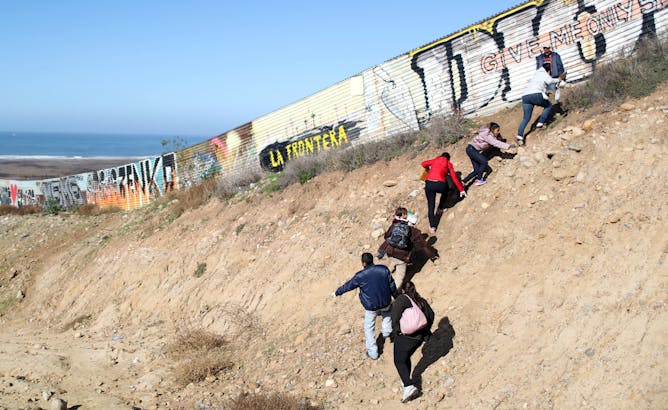|
|
|
Editor's note
|
|
President Trump is pulling out all the stops to get a wall built along the U.S.-Mexico border, including forcing a partial government shutdown that has now lasted 19 days. In addition to the financial woes the shutdown is creating for hundreds of thousands of federal workers and businesses that depend on an open government, Trump is putting something else on the line: his presidency. In an analysis of the longest shutdowns since 1977, political scientist John Tures found that in most cases presidents ended up falling in approval ratings and losing their next bid for office. “When the government is closed, history shows the president will be held accountable,” he writes.
In last night’s televised address, Trump spoke to Americans about the shutdown and immigration. Reasserting dubious old claims that criminals, drug smugglers and human traffickers are flooding across the U.S.-Mexico border, he demanded that Congress fund a $5.7 billion steel barrier to “protect our country.” But the southern border is not actually the national security threat Trump says it is. Six immigration scholars
explain who’s actually trying to get into the U.S. – and why.
And, if you’re like many people, you might be looking for ways to stay motivated with your New Year’s resolutions now that the novelty has worn off. Camilla Nonterah, a counseling psychologist at the University of Richmond, explains why behavior change is so hard – and why you can do it! Nonterah also offers several suggestions to help, including the setting of specific, achievable goals.
|
Danielle Douez
Associate Editor, Politics + Society
|

|
|
Top stories
|

President Donald Trump on the South Lawn of the White House.
AP Photo/Alex Brandon
John A. Tures, Lagrange College
The popular opinion is that presidents win government shutdowns, but a review of polling evidence paints a different picture.
|

Migrants from Honduras, part of the Central American caravan, trying to reach the United States in Tijuana, Mexico, in December 2018.
Reuters/Mohammed Salem
Catesby Holmes, The Conversation
Immigration experts explain who's really trying to cross the US-Mexico border, what they want — and why immigration, even undocumented immigration, actually benefits the country.
|

Staying on track with exercise goals can be hard without a plan to deal with stressors that get in the way.
Flamingo Images/Shutterstock.com
Camilla Nonterah, University of Richmond
Behavior change is very hard. Try as we might to keep those New Year's resolutions, many have given up by this time. Here are some ways to keep going and stay on track, from a counseling psychologist.
|
Science + Technology
|
-
Terry Thompson, University of Maryland, Baltimore County
European countries, especially the Baltic states of Estonia, Latvia and Lithuania, have confronted Russian disinformation campaigns for decades. The US can learn from their experience.
-
Gaurav Khanna, University of Massachusetts Dartmouth
Feel like visiting another star system or dimension? You can do this by traveling through a spacetime portal of a black hole. But you better choose carefully. All black holes are not created equal.
|
|
|
|
|
Politics + Society
|
-
Paul J. Fleming, University of Michigan; William D. Lopez, University of Michigan
Interviews with immigrants health service providers in metro Detroit reveal a climate of fear that may affect the health of families.
-
Justin Buchler, Case Western Reserve University
Many states are arguing over how to draw district lines. But drawing legislative district lines is an exercise in tradeoffs.
|
|
Most read on site
|
-
Micaela Martinez, Columbia University Medical Center; Kevin M. Bakker, University of Michigan
Did you ever consider that human beings might have a breeding season? Birth seasonality exists – and has interesting implications for childhood disease outbreaks.
-
Erin Connelly, University of Pennsylvania
A team of medievalists and scientists look back to history – including a 1,000-year-old eyesalve recipe – for clues to new antibiotics.
-
Wendy Whitman Cobb, Cameron University
China just became the first country to land a probe on the far side of the moon. It's a technological achievement and another sign of China's capabilities and ambitions in space.
|
|
|
|
| |
| |
|
|
|
|
|
|
|